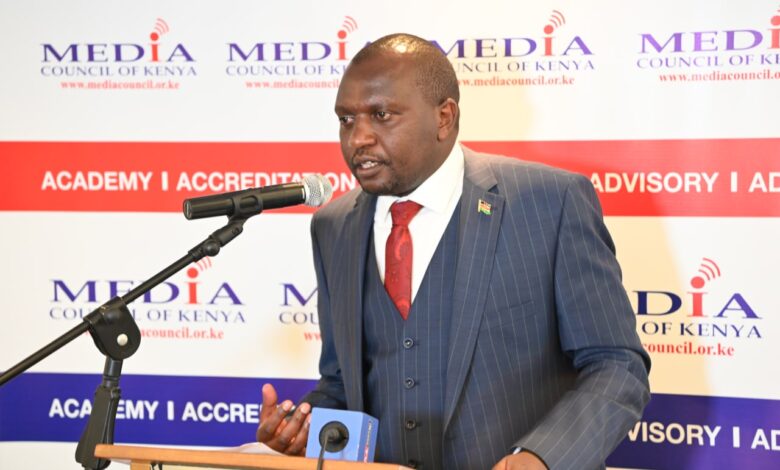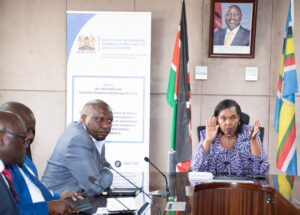Media Council Set to Lose Media Training Mandate in Bold Sector Overhaul Proposal
In Line with Regulatory Reforms, SWG Proposes a Major Overhaul of MCK’s Governance Structures

Nairobi, Sept 19 – In a move likely to radically reshape Kenya’s media regulation, the Information, Communications, and Digital Economy Sectoral Working Group (SWG) has proposed major changes that could dismantle a core aspect of the Media Council of Kenya’s (MCK) role. The SWG recommends stripping MCK of its authority to train journalists and other media workers—a function that has been a financial lifeline for the regulatory body—under sweeping proposals to overhaul the Media Act.
For years, MCK’s training programs have been a major part of its influence, but critics have long argued that these programs fall outside its mandate of content regulation, standards setting, and journalists’ accreditation. The SWG report agrees that these programs are deeply flawed, describing them as contradictory and undermining the Council’s regulatory role. It proposes a new overarching Media Act designed to radically reshape the media landscape by consolidating related institutions and legislation.
If enacted, these recommendations will strip MCK of its control over training and a crucial revenue stream, a situation that has long placed it in competition with other industry players for capacity-building and journalist training funds. The SWG’s findings reveal that MCK’s direct involvement in training has conflicted with its role as a neutral regulator. It argues that by engaging in training, MCK has blurred the lines between regulation and service provision, complicating its regulatory duties and unnecessarily straining relationships with industry stakeholders.
It further recommends redefining MCK’s role in training to avoid conflicts of interest and maintain its regulatory integrity. The proposal suggests limiting MCK’s involvement to collaborating with curriculum developers to ensure the training of professional content creators. Currently, MCK’s functions include setting media standards, regulating compliance, promoting professionalism and ethics, accrediting journalists and media enterprises, and ensuring media sustainability.

The proposed overarching Media Act would also require a review of existing legislation to align Kenya’s media laws with constitutional protections for media freedom and expression. The SWG, led by Prof. Timothy Mwololo Waema, identifies the MCK’s current legal structure as problematic. It notes that this structure limits industry participation in decision-making, despite the Council’s claims of a co-regulation model.
Another glaring issue is the MCK’s hosting of the Media Complaints Commission, which critics have said presents a clear conflict of interest. Complainants dissatisfied with MCK’s rulings have no other avenue for recourse but to appeal to a body housed by the same institution, a practice the SWG deems irregular and unsustainable for effective oversight.
In addition, the SWG highlights MCK’s over-reliance on government funding, a situation long criticized by industry proponents for undermining its objectivity and independence. This financial dependence, coupled with MCK’s internal structure, leaves its operations vulnerable to external influences, which has remained as one industry’s concerns about its impartiality.
The report also addresses the overlapping roles of MCK, the Communications Authority (CA) and the Kenya Film Classification Board (KFCB). This has created significant confusion in the broadcast media industry. Despite strong constitutional provisions, the industry struggles with contradictory regulations from these bodies. Media supporters have criticized CA for instance for overstepping its mandate into content regulation, which clashes with constitutional limits on its role in managing broadcasting frequencies. This overreach was notably witnessed during the 2017 elections when the government used police to shut down mainstream TV stations to prevent coverage of Raila Odinga’s “swearing-in” ceremony.
Similarly, the KFCB, a state agency mandated to regulate film content creation, possession, broadcasting, and distribution as per the Film and Stage Plays Act Cap 222. Media advocates have long criticized the overlap between MCK and KFCB regarding content regulation. Critics argue that KFCB’s oversight of film content conflicts with MCK’s role in setting media standards and regulating content, leading to inconsistent enforcement and bureaucratic inefficiencies.

To cure these overlaps, the SWG proposes transferring KFCB’s content regulation responsibilities to MCK and revising related legislation to streamline oversight and resolve jurisdictional conflicts. It also recommends amending specific clauses in the Media Council Act and the Kenya Information and Communications Act (KICA) 2009 to address issues of overlapping regulatory responsibilities and enhance the effectiveness of media oversight in Kenya.
According to the recommendation, the Media Council Act should be revised to give MCK exclusive authority over media content regulation, including oversight of media enterprises and content creators. This aligns with Article 34(5) of the Constitution, which designates MCK as the body responsible for setting media standards and ensuring compliance. Meanwhile, the CA would retain control over airwaves, radio frequencies, and signal distribution, focusing on technical matters. This separation of duties aims to eliminate overlaps and reduce confusion within the media industry.
The report highlights that harmonizing these regulations will strengthen media freedom under Article 34, while protecting rights such as national security and public order as outlined in Article 33(2). Media freedom advocates have expressed concerns about government interference. They hope these sweeping regulatory amendments will address these issues by clearly defining the roles of MCK and CA, aiming to protect media independence while ensuring accountability for content that could incite violence or risks public safety.
In tandem with these regulatory reforms, the SWG proposes a major overhaul of MCK’s governance structures. The current governance structure of the Media Council of Kenya (MCK) has been criticized for its susceptibility to government influence. The current governance structure of the Media Council of Kenya (MCK) has been widely criticized for being vulnerable to government influence. While MCK board members are selected by a panel nominated by 13 key stakeholders, the Cabinet Secretary for Information, Communication, and Digital Economy (ICDE) plays a significant role in supporting the process and gazetting the appointments. This involvement has raised concerns about potential political interference and compromised independence.

In response to these issues, the SWG proposes reconstituting the MCK as a fully independent body corporate. Under this new model, board members would be nominated by media stakeholders through a competitive and transparent process. This approach aims to distance the Council from government influence and ensure that its decisions are free from external pressures.
Furthermore, the reforms would implement three-year terms for Council members, with strict guidelines for their removal, ensuring greater accountability and adherence to constitutional standards, particularly those outlined in Chapter Six. These changes are designed to address the current governance issues by creating a more independent and accountable MCK.
The report also recommends amending the MCK Act to establish a secretariat and secure MCK’s funding directly from the Exchequer, this will ensure its independence and make it accountable to Parliament rather than the Ministry. This also complements the SWG’s key recommendations, which include establishing a National Content and Media Policy to enhance media diversity and independence.
Under this policy, a Media Diversity and Sustainability Fund would be created to support media diversity, research, journalist training, and public interest news. Media freedom advocates have welcomed the recommendations terming them “comprehensive and partly radical” with far-reaching changes that signal a turning point for Kenya’s media regulation framework. The Sectoral Working Group was formed in September last year to review and assess existing policies, legislative frameworks, and operational structures within the ICT sector in Kenya
Note: In tomorrow’s final installment of our series on the Information Communication and Digital Economy SWG report, we’ll examine the report’s insights into the strengths and weaknesses of Kenya’s media policies and regulatory frameworks. We’ll dig into their impact on the media sector and the SWG’s proposed recommendations. Don’t miss this crucial analysis of the policies, legislative frameworks, and operational structures that could shape the future of Kenya’s media industry, which has been teetering on the brink of capture.
Might be of help
There is hope of good things if the proposed regulations are implemented